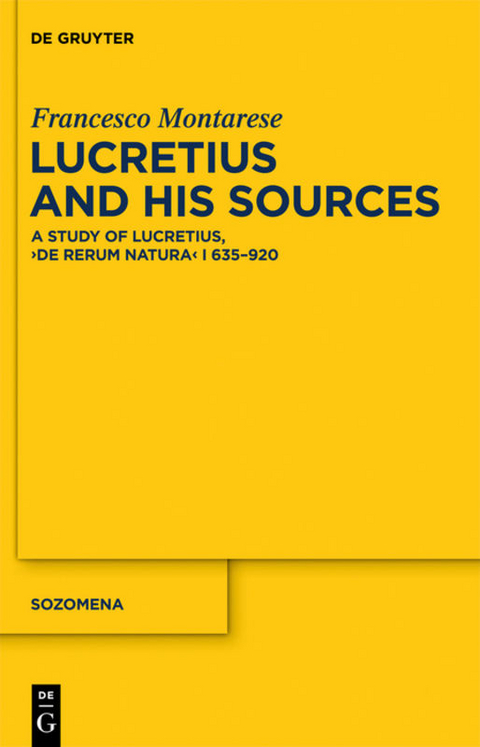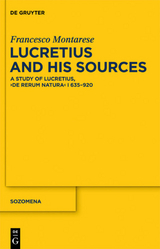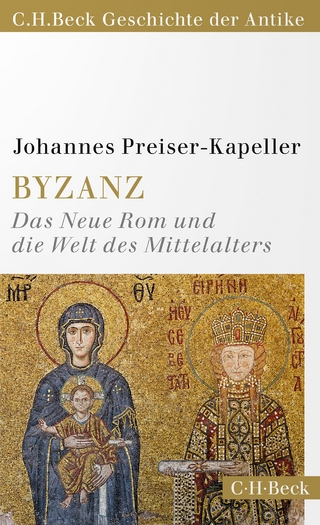Lucretius and His Sources
A Study of Lucretius, "De rerum natura" I 635-920
Seiten
2012
De Gruyter (Verlag)
978-3-11-019452-4 (ISBN)
De Gruyter (Verlag)
978-3-11-019452-4 (ISBN)
„Sozomena“ bedeutet auf Griechisch „Gerettetes“. Die Reihe widmet sich der Erschließung von Texten, die aus der griechischen und römischen Antike nur durch ausserordentliche Fund-Umstände erhalten geblieben sind - allen voran durch Papyri, von denen Tausende in Universitäten und Bibliotheken unentziffert vorhanden sind. Die Reihe soll hauptsächlich Texte edieren und interpretieren, aber auch die Methoden der Erschließung diskutieren. Verschiedene Buchtypen werden daher hier veröffentlicht: Texteditionen, Kommentare, Monographien und Sammelbände. Die Hauptsprache der Publikationen ist Englisch, daneben auch Deutsch und Italienisch.
This book discusses Lucretius’ refutation of Heraclitus, Empedocles, Anaxagoras and other, unnamed thinkers in De Rerum Natura 1, 635-920. Chapter 1 argues that in DRN I 635-920 Lucretius was following an Epicurean source, which in turn depended on Theophrastean doxography. Chapter 2 shows that books 14 and 15 of Epicurus’ On Nature were not Lucretius’ source-text. Chapter 3 discusses how lines 635-920 fit in the structure of book 1 and whether Lucretius’ source is more likely to have been Epicurus himself or a neo-Epicurean. Chapter 4 focuses on Lucretius’ own additions to the material he derived from his sources and on his poetical and rhetorical contributions, which were extensive. Lucretius shows an understanding of philosophical points by adapting his poetical devices to the philosophical arguments. Chapter 4 also argues that Lucretius anticipates philosophical points in what have often been regarded as the ‘purple passages’ of his poem - e.g. the invocation of Venus in the proem, and the description of Sicily and Aetna - so that he could take them up later on in his narrative and provide an adequate explanation of reality.
This book discusses Lucretius’ refutation of Heraclitus, Empedocles, Anaxagoras and other, unnamed thinkers in De Rerum Natura 1, 635-920. Chapter 1 argues that in DRN I 635-920 Lucretius was following an Epicurean source, which in turn depended on Theophrastean doxography. Chapter 2 shows that books 14 and 15 of Epicurus’ On Nature were not Lucretius’ source-text. Chapter 3 discusses how lines 635-920 fit in the structure of book 1 and whether Lucretius’ source is more likely to have been Epicurus himself or a neo-Epicurean. Chapter 4 focuses on Lucretius’ own additions to the material he derived from his sources and on his poetical and rhetorical contributions, which were extensive. Lucretius shows an understanding of philosophical points by adapting his poetical devices to the philosophical arguments. Chapter 4 also argues that Lucretius anticipates philosophical points in what have often been regarded as the ‘purple passages’ of his poem - e.g. the invocation of Venus in the proem, and the description of Sicily and Aetna - so that he could take them up later on in his narrative and provide an adequate explanation of reality.
Francesco Montarese, Mander Portman Woodward Colleges, London, UK.
| Erscheint lt. Verlag | 18.5.2012 |
|---|---|
| Reihe/Serie | Sozomena ; 12 |
| Verlagsort | Berlin/Boston |
| Sprache | englisch |
| Maße | 155 x 230 mm |
| Gewicht | 594 g |
| Themenwelt | Geschichte ► Allgemeine Geschichte ► Altertum / Antike |
| Geisteswissenschaften ► Philosophie ► Philosophie Altertum / Antike | |
| Geisteswissenschaften ► Sprach- / Literaturwissenschaft ► Literaturwissenschaft | |
| Schlagworte | Doxographie • Doxography • epicurus • Epikur • Herculaneum Papyri • Lucretius • Lucretius; Epicurus; Herculaneum Papyri; Doxography; Reception of Presocratics • Lukrez • Papyri aus Herculaneum • Reception of Presocratics • Rezeption der Vorsokratiker |
| ISBN-10 | 3-11-019452-X / 311019452X |
| ISBN-13 | 978-3-11-019452-4 / 9783110194524 |
| Zustand | Neuware |
| Haben Sie eine Frage zum Produkt? |
Mehr entdecken
aus dem Bereich
aus dem Bereich
die Inszenierung der Politik in der römischen Republik
Buch | Hardcover (2023)
C.H.Beck (Verlag)
48,00 €




